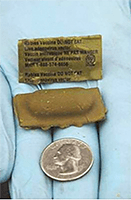Vermont and U.S. Dept. of Agriculture (USDA) Wildlife Services mark a quarter century of cooperative efforts to stop the spread of the rabies with the 25th annual rabies bait drop, scheduled to start Aug. 5. The week-long bait drop is part of a nationally coordinated effort to halt the fatal disease.
Rabies vaccine — in the form of a sweet-smelling oral bait that is attractive to raccoons and skunks — will be dropped in rural areas of Vermont from low-flying aircraft and placed by hand in residential centers. Approximately 450,000 quarter-sized blister packs containing rabies vaccine will be distributed in nearly 100 Vermont communities across 10 of the state’s 14 counties. (The southern four counties —Rutland, Windsor, Bennington and Windham — are not included.)

An example of a rabies bait blister pack.
A switch allows pilots to control where the baits fall — in order to avoid roadways, homes and other places where people are most likely to be.
Vermont Public Health Veterinarian Natalie Kwit said the annual drop has been an important part of the state’s focus on curbing the risk of rabies in animals and humans. “The bait drop is an example of public health at work across agencies, both state and federal. We are grateful to have partners like the USDA Wildlife Services and the Vermont of Fish and Wildlife Dept.,” said Dr. Kwit.
Rabies is a deadly viral disease of the brain that infects mammals. It is most often seen in raccoons, skunks, foxes and bats, but unvaccinated pets and livestock can also get rabies. The virus is spread primarily through the bite of an infected animal. If a rabies exposure is left untreated, the disease is almost always fatal in humans and animals. However, treatment is 100% effective when given soon after a person is bitten by a rabid animal.
The bait packs are not poisonous and are not harmful to people, pets or wildlife. “You can’t get rabies from the bait,” said Dr. Kwit, “but it’s important that if you find a bait pack, don’t touch it and please leave it undisturbed so that they can be eaten by wild animals.”
If the bait must be moved, use gloves or a plastic bag in case the blister pack is damaged. If your pet eats a bait, or if a child brings one home, let officials know by calling the Vermont Rabies Hotline at 1-800-4-RABIES (1-800-472-2437) or call the toll-free number printed on the bait.
So far this year, 10 animals in Vermont have tested positive for rabies, four of which have been raccoons.
According to wildlife officials, rabid animals often show a change in their normal behavior, but you cannot tell whether an animal has rabies simply by looking at it. People should not touch or pick up wild animals or strays — even baby animals.
If you suspect an animal may have rabies, call the Rabies Hotline: (1-800-472-2437) or 1-802-223-8697.



